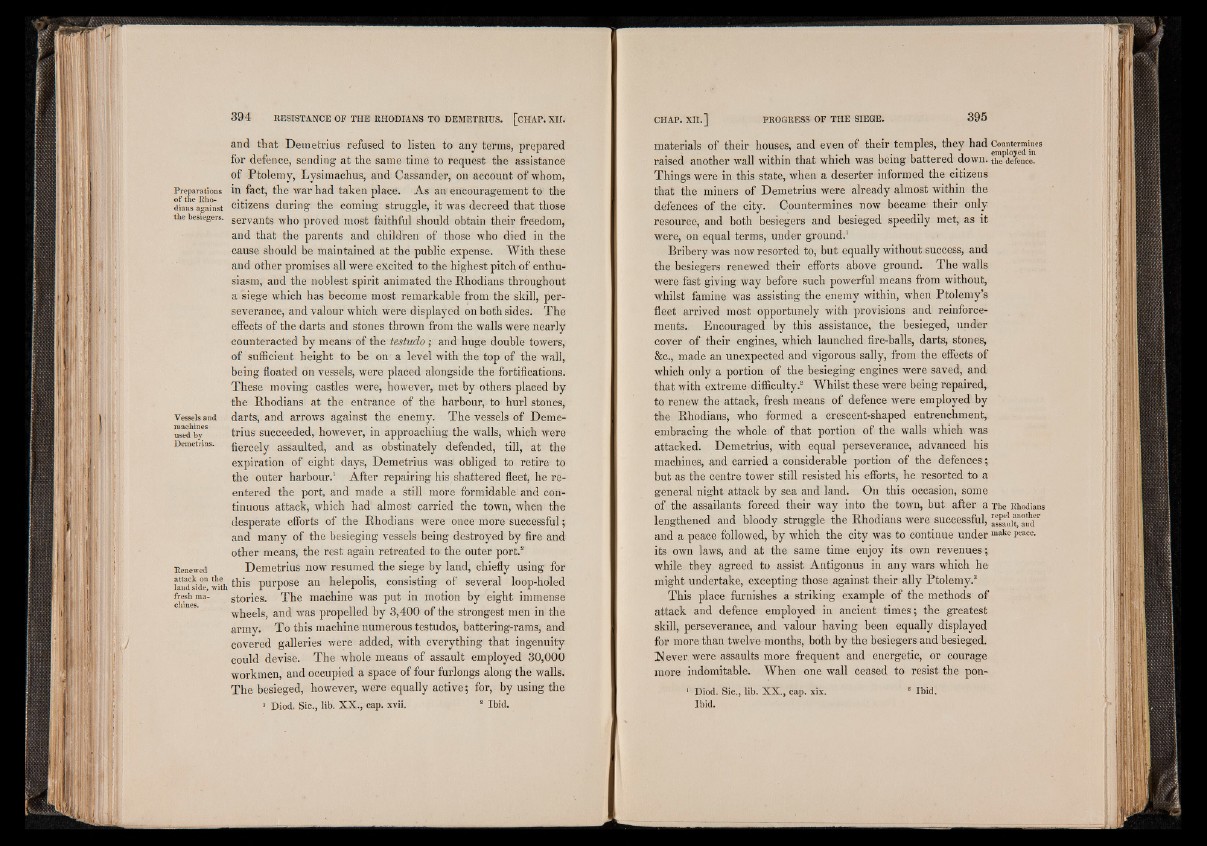
and that Demetrius refused to listen to any terms, prepared
for defence, sending at the same time to request the assistance
of Ptolemy, Lysimachus, and Cassander, on account of whom,
Preparations in fact, the war had taken place. As an encouragement to the
dians against citizens during the coming struggle, it was decreed that those
the besiegers. servants wh0 proved most faithful should obtain their freedom,
and that the parents and children of those who died in the
cause should be maintained at the public expense. With these
and other promises all were excited to the highest pitch of enthusiasm,
and the noblest spirit animated the Rhodians throughout
a siege which has become most remarkable from the skill, perseverance,
and valour which were displayed on both sides. The
effects of the darts and stones thrown from the walls were nearly
counteracted by means of the tesiudo; and huge double towers,
of sufficient height to be on a level with the top of the wall,
being floated on vessels, were placed alongside the fortifications.
These moving castles were, however, met by others placed by
the Rhodians at the entrance of the harbour, to hurl stones,
vessels and darts, and arrows against the enemy. The vessels of Demeused
by* trius succeeded, however, in approaching the walls, which were
Demetnas. fiercely assaulted, and as obstinately defended, till, at the
expiration of eight days, Demetrius was obliged to retire to
the outer harbour.1 After repairing his shattered fleet, he reentered
the port, and made a still more formidable and continuous
attack, which had almost carried the town, when the
desperate efforts of the Rhodians were once more successful;
and many of the besieging vessels being destroyed by fire and
other means, the rest again retreated to the outer port.2
Renewed Demetrius now resumed the siege by land, chiefly using for
la n ^ id e with this purpose an helepolis, consisting of several loop-holed
fresh ma- stories. The machine was put in motion by eight immense climes. . , wheels, and was propelled by 3,400 of the strongest men in the
army. To this machine numerous testudos, battering-rams, and
covered galleries were added, with everything that ingenuity
could devise. The whole means of assault employed 30,000
workmen, and occupied a space of four furlongs along the walls.
The besieged, however, were equally active; for, by using the
1 Diod, Sic., lib. X X ., cap. xvii. ‘ Ibid.
materials of their houses, and even of their temples, they had Countermmes
raised another wall within that which was being battered down. the defence.
Things were in this state, when a deserter informed the citizens
that the miners of Demetrius were already almost within the
defences of the city. Countermines now became their only
resource, and both besiegers and besieged speedily met, as it
were, on equal terms, under ground.1
Bribery was now resorted to, but equally without success, and
the besiegers renewed their efforts above ground. The walls
were fast giving way before such powerful means from without,
whilst famine was assisting the enemy within, when Ptolemy’s
fleet arrived most opportunely with provisions and reinforcements.
Encouraged by this assistance, the besieged, under
cover of their engines, which launched fire-balls, darts, stones,
&c., made an unexpected and vigorous sally, from the effects of
which only a portion of the besieging engines were saved, and
that with extreme difficulty.2 Whilst these were being repaired,
to renew the attack, fresh means of defence were employed by
the Rhodians, who formed a crescent-shaped entrenchment,
embracing the whole of that portion of the walls which was
attacked. Demetrius, with equal perseverance, advanced his
machines, and carried a considerable portion of the defences;
but as the centre tower still resisted his efforts, he resorted to a
general night attack by sea and land. On this occasion, some
of the assailants forced their way into the town, but after a The Rhodians
lengthened and bloody struggle the Rhodians were successful,
and a peace followed, by which the city was to continue under make Peaceits
own laws, and at the same time enjoy its own revenues;
while they agreed to assist Antigonus in any wars which he
might undertake, excepting those against their ally Ptolemy.3
This place furnishes a striking example of the methods of
attack and defence employed in ancient times; the greatest
skill, perseverance, and valour having been equally displayed
for more than twelve months, both by the besiegers and besieged,
liever were assaults more frequent and energetic, or courage
more indomitable. When one wall ceased to resist the pon-
1 Diod. Sic., lib. X X ., cap. xix. 2 Ibid.
Ibid.